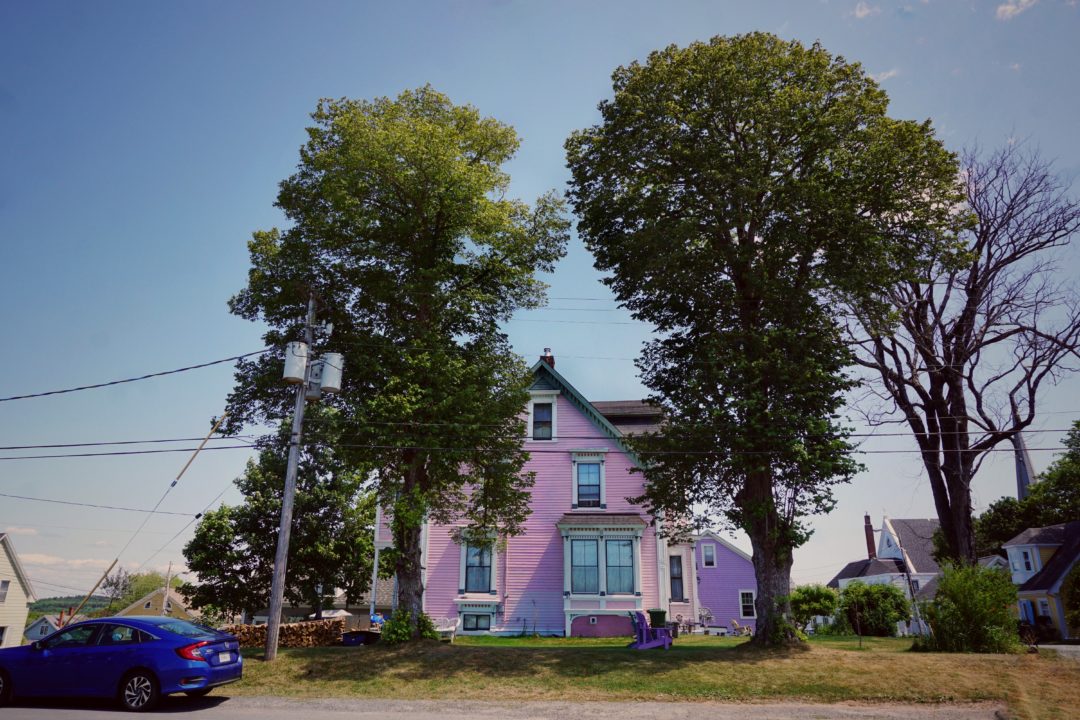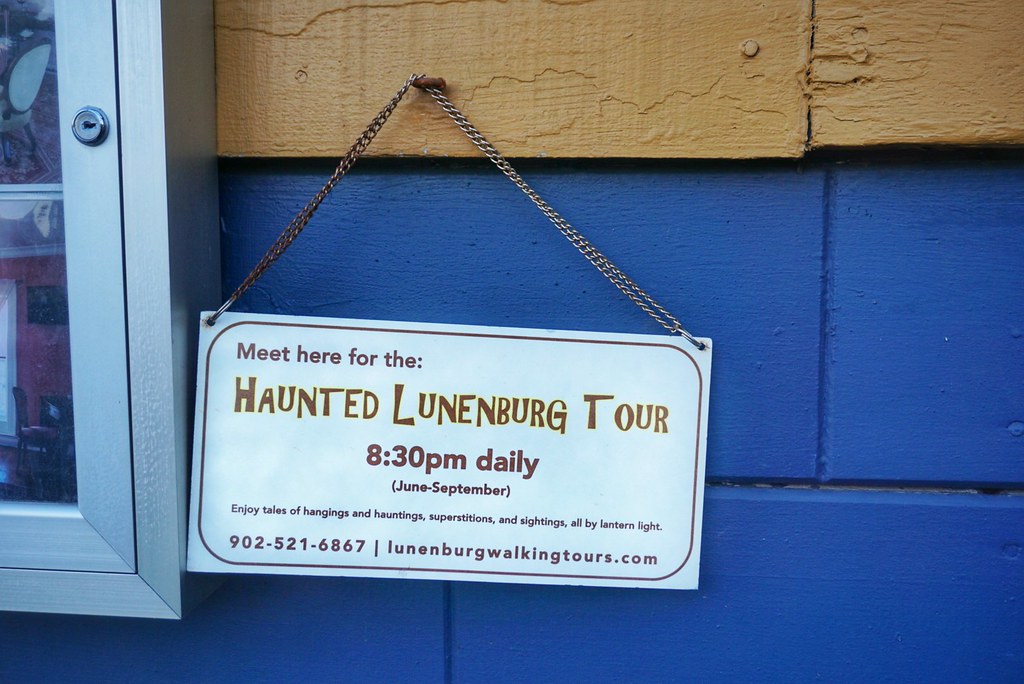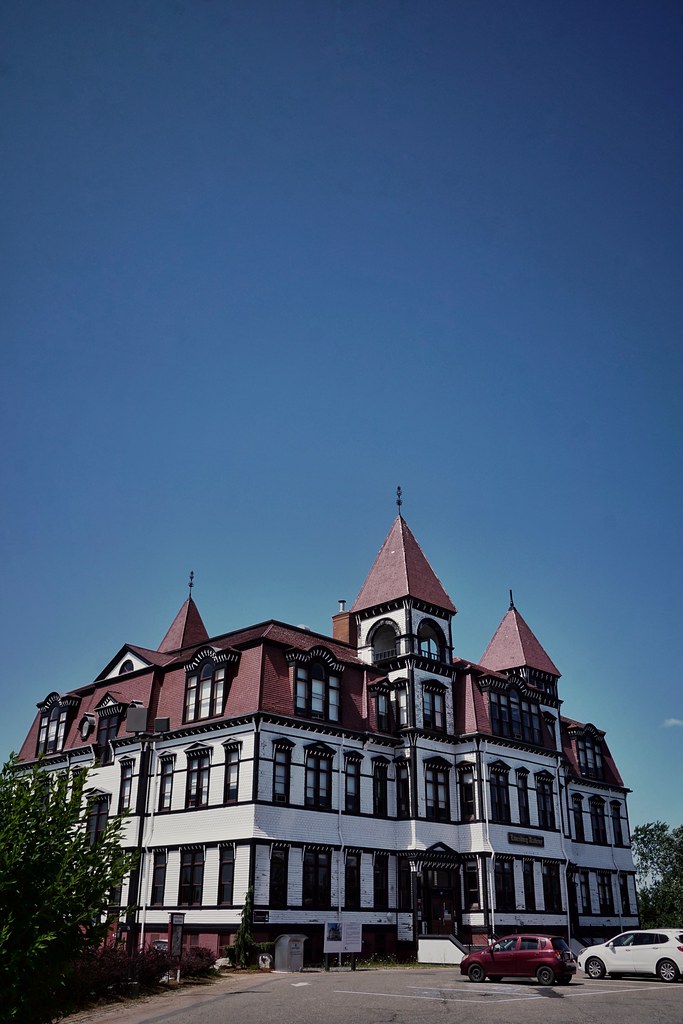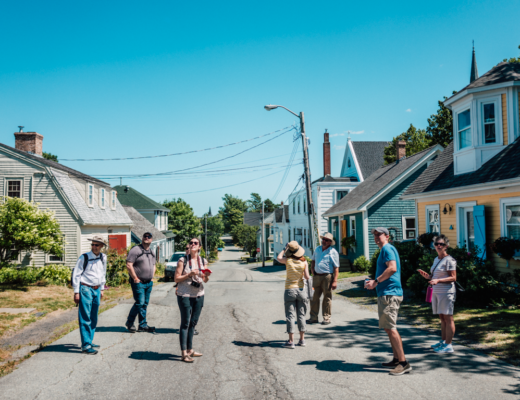At first glance, the little town of Lunenburg, Nova Scotia, is picture-perfect.
Under bright skies, tourists flock to Lunenburg to eat ice cream, shop for souvenirs, and learn about the town’s rich maritime history at the Fisheries Museum of the Atlantic.
Lunenburg is famous for its brightly coloured clapboard houses lining the narrow streets, and for its picturesque harbour, home to the famous tall ship Bluenose II. And as one of the best surviving British-built colonial towns in North America, the whole of Lunenburg’s Old Town is also a UNESCO World Heritage Site.
But as the sun begins to set, the streets of Lunenburg seem to mysteriously empty.
What you don’t see in the daylight is Lunenburg’s spooky side – because this is a town filled to the brim with ghosts, witches, and spiritual stories. Every night, the streets of the Old Town are lit up by lanterns as the braver tourists set out on the Haunted Lunenburg Walking Tour.
Lunenburg is an historic town – but it’s also a haunted one.
A history of Nova Scotia: why is it so haunted?
Over the generations, the people of Nova Scotia have grown up in close proximity with death.
The province’s maritime history is largely responsible: as almost all of Nova Scotia’s landmass is unsuitable for agriculture, the economy has always been based around fishing. When sailors left shore they’d be gone for months at a time, and there was no guarantee they’d return.
Storms, shipwrecks and drownings often occurred. Those lost at sea were commemorated with granite memorials in the places they hailed from – and the bodies of victims who made it back home were buried in cemeteries right in the centre of towns, not shunted off to the outskirts.
It’s been said that Lunenburg has more folklore, witches, superstitions and ghost stories than any other place in Nova Scotia. And when you stand in the town’s 300-year-old cemetery at the top of a street named Gallows Hill, you get the feeling it could be true.
Read more: the most beautiful cemetery I’ve ever seen
Although we’d only been in Nova Scotia for two days when we arrived in Lunenburg, Kim and were already getting familiar with the province’s spooky past.
In Halifax the night before, we’d enjoyed a fancy dinner at the Five Fishermen Restaurant – and in between bites of lobster mac and cheese I’d been on the lookout for poltergeist activity. The Five Fishermen building used to be a funeral parlour and mortuary back in the 19th century and prepared dozens of the Titanic victims for burial.
And just that morning we’d visited the lighthouse at Peggy’s Cove, famed for the ghost of a woman in a blue dress named Margaret. Her husband was lost to the sea, and she’s wandered the rocks mourning for him ever since.
So we were well-prepared for some haunted goings on in Lunenburg. Or so we thought.

[Photo by Kim Leuenberger]
A spooky night on the Haunted Lunenburg Walking Tour
The sun had already set when we met our guide Kerriann beside a splintered bench. A tiny sign hung above it, advertising the tour; a collection of lanterns sat on the steps beside her, candles waiting to be lit.
Kerriann introduced herself as an eighth-generation Lunenburger, and a direct descendant of the Moreash clan. Many of her ancestors called these same streets home, and their names cropped up repeatedly throughout the tour.
A bored-looking teenager with his parents walked towards us. They were the last three members of our little tour group, and after Kerriann handed out the lanterns we set off together.

[Photo by Kim Leuenberger]
From the moment she began to speak, it was clear that Kerriann had worked extremely hard to perfect her storytelling skills – and I realised that it wouldn’t be fair for me to give away the specifics of her stories in writing.
What I can describe is the atmosphere she created.
As we wandered past ornate houses and looming hotels, Kerriann told us ghost stories about Lunenburg’s long-dead residents: the disgruntled hotel owner tormenting guests; the murderous husband who was the last man hung beside the jail; the young girl forever standing in a ‘Lunenburg Bump’, waiting for her long lost love.
The ‘Lunenburg Bump’ is a curious architectural wonder in the town – an extended dormer window built into the top floor of many Lunenburg houses, it first began as a way to provide a bit more light and air, but quickly gained pace as neighbours took the idea and developed it.
Nowadays Lunenburg is filled with Bumps of all varieties, and it’s all too easy to imagine them as a type of ‘widows walk’. How many wives, fiancees, mothers and daughters of sailors and captains have patiently stood watch up there, waiting for their seafaring men to come home?
Superstitions are still alive and well in Lunenburg
The widow’s walk is just one of many superstitions to still hold weight here. The residents of Lunenburg are a tight-knit community, which means they’ve been raised with an oral history.
Familiar stories passed down through generations are responsible for shaping the behaviours of thousands of Lunenburgers – and alongside her ghostly tales, Kerriann explained the amount of superstitious belief which has influenced much of Lunenburg: how wearing grey mittens when fishing would bring grey skies, or how Lunenburg houses were built with identical front and back doors to confuse the devil, who only entered through the back door.
We learned that it’s legal to spit in public – but only when you’ve seen a single crow. The sight of that one bird is bad luck, but spitting on the ground invites a second crow to join it. Unfortunately the governors in Halifax cottoned onto this belief and introduced a fine for spitting in public in their city, which was often referred to as the Lunenburg tax on account of who often ended up paying it!
Kerriann told us that flipping things is bad luck, as it mimics the action of a boat capsizing. That means eggs are always cooked ‘over easy’; food comes out of a can with a spoon instead of being turned upside down; and women serve freshly-baked bread by taking it straight from the oven, running a knife around and lifting it out.
These superstitions make sense when you remember this community revolved around the sea – a place full of unpredictability and danger. Sailors have always been renowned for their superstitious nature, but it’s fascinating to realise that many modern-day Lunenburgers still wholeheartedly believe in these things, and abide by them too.
Read more: traditions and superstitions in the South American mountains

[Photo by Kim Leuenberger]
The mysterious stars of St John’s Anglican Church
As darkness fell, we made our way slowly up Gallows Hill until we reached St John’s Anglican Church.
This Gothic building was the first church built in Lunenburg in 1754 and the second oldest Anglican church in Canada, but it was tragically set on fire by arsonists on Halloween Night, 2001. The precious stained glass windows had to be smashed to gain access to the church and attempt to fight the fire which ultimately destroyed half the building and all the contents within.

[Photo by Kim Leuenberger]
Inside, we stared up at a domed ceiling above the altar which was covered with stars. Kerriann told us that during the post-fire restoration (achieved by solely using salvaged wood from the wreckage), historians realised the spacing of the stars seemed somewhat strange – so they called in star experts. Eventually they realised it was the same constellation visible from Lunenburg on 24th December, the night Jesus was born.
Somehow this significant fact had slipped from history – but thanks to the fire, it came to light again.

[Photo by Kim Leuenberger]
The haunted graves of Hillcrest Cemetery
At the very top of Gallows Hill sits Hillcrest Cemetery, a sprawling plot of land where the oldest grave marker dates back to 1761, eight years after Lunenburg was established.
We approached the cemetery beneath the pale light of a watery moon, and I could feel the air of unease settle around the group. Being in such close proximity to a lot of very old graves felt rather vulnerable.
I stepped onto the damp grass, holding my lantern closer to my face – I didn’t want to trip over any gravestones and give myself a heart attack – but luckily Kerriann knew exactly where she was going. She picked an easy route between old slate gravestones with German names until she reached one surrounded by a wrought-iron fence. It was the grave of Sophia, a 14 year old girl who died of a broken heart.
While Kerriann told us the sad story of Sophia’s untimely death after she was accused of stealing $10, I looked furtively around at the neighbouring graves. Did Sophia still wander this patch of ground?

[Photo by Kim Leuenberger]
The basement ghost of Lunenburg Academy
The ‘Castle on the Hill’ is a massive, three-storey building which dates back to the 1890s and has housed the local primary school for centuries. It’s also just opposite Hillcrest Cemetery, meaning generations of children walked past these graves on their way to and from class.
Lunenburg is a landmark building for both historical and architectural reasons – it’s imposing enough just to look at – but as you’d expect in this town, it’s seriously haunted too.
The basement was nicknamed ‘The Dungeon’ by scared students, thanks to an evil feeling which pervaded the space and the rumour of a monster inhabiting one of the toilet stalls. Little boys were dared to enter alone, goading each other on despite the fear, while girls refused to go inside unless they were in pairs.
But the more compelling ghost story is about Sidney Kernickle, a school janitor who was such a strong spiritual force in the Academy that a ghost hunters show paid $50,000 for a local to show them around the building, eventually capturing an image of a face in one of the windows. When the image was circulated around Lunenburg, someone pulled out a yearbook from 1960 and identified Mr Kernickle!

[Photo by Kim Leuenberger]
As Kerriann told us about the ghost of Lunenburg Academy, I glanced over at a car parked in front of the building. There was a middle-aged man sitting in the car’s front seat: he was disarmingly still, and I wasn’t entirely sure what he was doing. Neither was the moody teen from our group, who slouched his way towards the car to investigate. I could see the tension in his shoulders as he approached, peering through the window to get a closer look.
I turned to Kim and whispered very quietly, “There’s a man in that car…” She jumped a mile in the air and everyone began to laugh, the ghostly tension dissipating for a moment.
But as we walked away from the dark red bricks of Lunenburg Academy which towered above us, I felt a chill run quickly down my spine. There were so many windows. Who knew if Sidney’s ghostly face was peering down at our little group as we walked away?
Lunenburg Walking Tours offers a selection of daily tours from June 1st to October 30th – ‘Essential Lunenburg’ at 10am & 2pm and ‘Haunted Lunenburg’ at 8.30pm. Their tours are also available year-round via reservation.
All the Lunenburg Walking Tours take about an hour and have the same prices:
- Adult: $25
- Youth: $15
- Family: $75
I can personally attest to the quality of both these tours – we received complimentary tickets for the Essential Lunenburg tour, and loved it so much that we immediately paid for the Haunted Lunenburg tour that same evening!
Read more about my adventures in Canada here
Pin this article if you enjoyed it!
NB: This trip was in partnership with Tourism Nova Scotia – but the ghost stories and haunted streets are all down to Lunenburg’s long-gone residents…











1 Comment
Steven Pickard
October 28, 2019 at 4:26 amOh ms Flora, I enjoyed this article about Lunenburg NS. The colorful descriptions of some of the people, venues and history that you always portray as a writer for the coved theater of the mind I hope other followers/readers see. Very very NICE